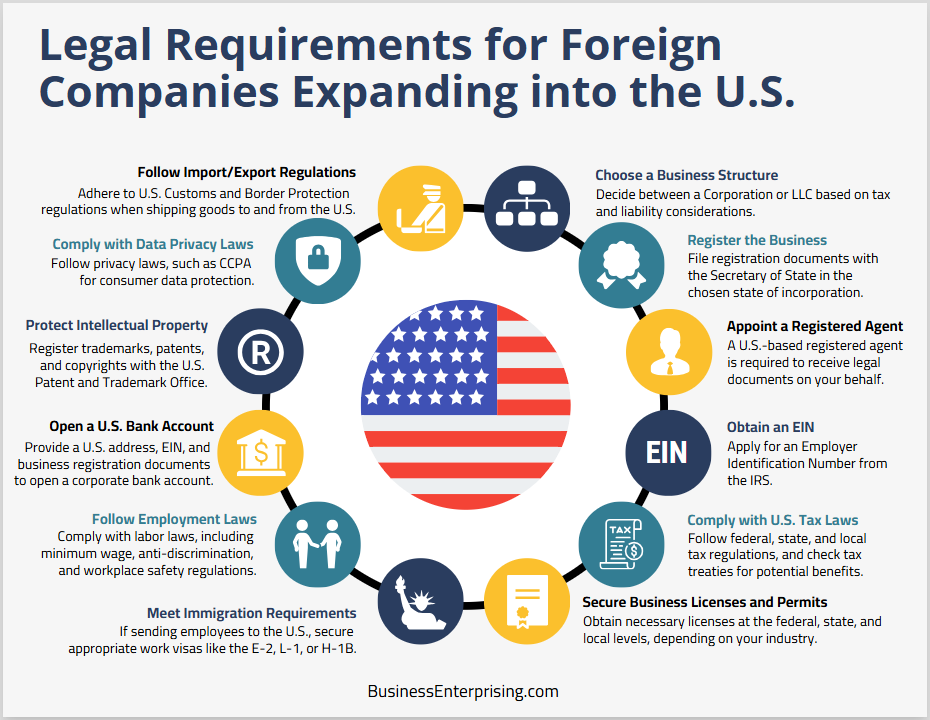 Expanding your business into the United States presents significant opportunities. However, it also involves navigating complex legal requirements. Understanding the legal requirements to enter the US is essential for a successful transition. This guide will help you comprehend key aspects such as business structures, visa considerations, tax obligations, regulatory compliance, intellectual property protection, and employment laws. By addressing these areas, you can establish a strong foundation for your operations in the U.S. Careful planning and adherence to legal protocols will facilitate a smooth and compliant entry into the American market.
Expanding your business into the United States presents significant opportunities. However, it also involves navigating complex legal requirements. Understanding the legal requirements to enter the US is essential for a successful transition. This guide will help you comprehend key aspects such as business structures, visa considerations, tax obligations, regulatory compliance, intellectual property protection, and employment laws. By addressing these areas, you can establish a strong foundation for your operations in the U.S. Careful planning and adherence to legal protocols will facilitate a smooth and compliant entry into the American market.
Choosing the Right Business Structure for US Expansion
When expanding your business into the United States, selecting the appropriate business structure is essential. Your choice will influence taxation, liability, and operational flexibility. The main structures to consider are Limited Liability Companies (LLCs), corporations, and partnerships.
An LLC offers limited liability protection, meaning your personal assets remain separate from business debts. Additionally, LLCs provide flexibility in management and taxation. You can choose to be taxed as a sole proprietorship, partnership, or corporation. However, it’s important to note that LLCs cannot issue stock, which may limit fundraising options.
Corporations, such as C corporations, are separate legal entities that can issue stock to raise capital. This structure provides limited liability protection, safeguarding your personal assets. Corporations are subject to double taxation, where profits are taxed at the corporate level and again when distributed as dividends. Nevertheless, corporations can attract investors more easily due to their ability to offer shares.
Partnerships involve two or more individuals or entities conducting business together. In a general partnership, all partners share equal responsibility for the business’s debts and obligations. Conversely, a limited partnership includes both general and limited partners. General partners manage the business and assume full liability, while limited partners contribute capital and have liability limited to their investment. It’s crucial to understand that partnerships do not provide the same level of personal asset protection as LLCs or corporations.
When considering the legal requirements to enter the US market, it’s vital to choose a structure that aligns with your business goals and risk tolerance. Each structure has distinct implications for taxation and liability. Therefore, consulting with legal and tax professionals can help you make an informed decision tailored to your specific circumstances.
Visa and Immigration Considerations for Foreign Business Owners and Employees
When expanding your business into the United States, understanding visa and immigration considerations is essential. The U.S. offers various visa options for foreign business owners and employees. Selecting the appropriate visa depends on your role and investment level.
For investors, the E-2 Treaty Investor visa allows nationals of treaty countries to develop and direct operations of a U.S. enterprise. This requires a substantial investment in a bona fide enterprise. Additionally, the EB-5 Immigrant Investor Program grants permanent residency to individuals investing significant capital in U.S. commercial enterprises that create jobs.
If you’re transferring executives or managers from an overseas office to a U.S. branch, the L-1A Intracompany Transferee Executive or Manager visa is suitable. This visa permits multinational companies to relocate qualified personnel to the U.S. for up to seven years. For employees with specialized knowledge, the L-1B visa is available, allowing stays of up to five years.
For hiring foreign professionals in specialty occupations, the H-1B visa is an option. This visa requires the position to necessitate specialized knowledge and at least a bachelor’s degree or its equivalent. However, the H-1B program has an annual cap, making the application process competitive.
Understanding these visa categories is crucial for compliance with legal requirements to enter the U.S. Each visa type has specific criteria and application procedures. Therefore, consulting with immigration professionals can help you navigate these complexities effectively.
Federal and State Tax Obligations for Foreign Companies
Expanding your business into the United States involves understanding both federal and state tax obligations. At the federal level, corporations must pay corporate income tax on their worldwide income. The current federal corporate tax rate is 21%. However, certain deductions and credits can reduce this rate. It’s important to note that foreign corporations engaged in a U.S. trade or business are taxed on income effectively connected with that business.
In addition to federal taxes, you must consider state-level taxes. Most states impose their own corporate income taxes, with rates varying across jurisdictions. Some states also have alternative taxes, such as franchise taxes or gross receipts taxes. Therefore, it’s essential to research the specific tax obligations in each state where your company operates.
Sales tax is another consideration. In the U.S., sales tax is governed at the state and local levels. If your business sells tangible personal property or certain services, you may need to collect and remit sales tax. The requirements differ by state, so understanding the rules in each relevant jurisdiction is crucial.
As an employer, you have additional tax responsibilities. You must withhold federal income tax, Social Security, and Medicare taxes from your employees’ wages. Employers are also responsible for paying a matching portion of Social Security and Medicare taxes, as well as federal unemployment tax. State unemployment taxes may also apply, depending on the state.
Understanding these tax obligations is a key part of the legal requirements to enter the U.S. market. Each tax type has specific regulations and compliance requirements. Therefore, consulting with tax professionals can help you navigate these complexities effectively.
Regulatory Compliance and Industry-Specific Licensing
When expanding your business into the United States, understanding regulatory compliance and industry-specific licensing is essential. The legal requirements to enter the US market vary by industry and location. Therefore, it’s important to research both federal and state regulations that apply to your business activities.
At the federal level, certain industries require specific licenses or permits. For example, businesses involved in alcohol, firearms, or aviation are subject to federal regulations. Additionally, if your business engages in activities regulated by a federal agency, you may need to obtain the appropriate federal license or permit. It’s important to identify which federal regulations apply to your operations.
State and local governments also impose their own licensing requirements. These can include general business licenses, as well as permits specific to your industry. For instance, restaurants often need health department permits, while construction companies may require contractor licenses. Therefore, it’s crucial to consult state and local authorities to determine the necessary licenses and permits for your business.
Industry-specific compliance needs further complicate the regulatory landscape. Sectors like healthcare, finance, and food services have stringent regulations to protect public safety and ensure ethical practices. For example, healthcare providers must comply with the Health Insurance Portability and Accountability Act (HIPAA), which sets standards for patient data protection. Similarly, financial institutions are subject to regulations such as the Sarbanes-Oxley Act (SOX), which mandates strict financial reporting and internal controls. Understanding these industry-specific regulations is essential to operate legally and avoid penalties.
Navigating these regulatory requirements can be complex. Therefore, consulting with legal professionals familiar with your industry and the jurisdictions where you plan to operate can be beneficial. They can provide guidance on obtaining necessary licenses and maintaining compliance with all applicable regulations.
Intellectual Property Protection and Legal Contracts
Protecting your intellectual property (IP) is essential when expanding into the United States. The legal requirements to enter the US market include safeguarding your trademarks, patents, and copyrights. Additionally, establishing robust legal contracts is crucial for partnerships and operations.
Trademarks protect brand identifiers like logos and names. To secure a trademark, you should register it with the United States Patent and Trademark Office (USPTO). This registration grants exclusive rights to use the mark nationwide. However, it’s important to monitor and enforce your trademark rights to prevent unauthorized use.
Patents safeguard inventions, granting exclusive rights to make, use, or sell the invention for a set period. To obtain a patent, you must file an application with the USPTO, detailing your invention’s uniqueness and utility. The process can be complex, so consulting a patent attorney is advisable.
Copyrights protect original works like literature, music, and software. In the U.S., copyright protection arises automatically upon creation. However, registering the copyright with the U.S. Copyright Office provides legal advantages, such as the ability to enforce rights in court.
Beyond IP protection, crafting strong legal contracts is vital. Clear agreements outline the terms of partnerships, employee relationships, and vendor interactions. These contracts help prevent disputes by setting expectations and responsibilities. Therefore, it’s beneficial to work with legal professionals to draft and review these documents.
In summary, securing your IP and establishing solid legal agreements are key steps in meeting the legal requirements to enter the US market. By proactively managing these aspects, you can protect your business interests and operate confidently.
Employment Laws and Hiring Practices for Foreign Businesses
When expanding your business into the United States, understanding employment laws and hiring practices is essential. The legal requirements to enter the US market encompass various federal and state labor regulations. Therefore, it’s important to familiarize yourself with these laws to build a compliant local workforce.
At the federal level, key legislation includes the Fair Labor Standards Act (FLSA), which sets minimum wage and overtime pay standards. Additionally, the Family and Medical Leave Act (FMLA) provides eligible employees with unpaid, job-protected leave for specified family and medical reasons. It’s important to note that these laws apply to most employers and employees across the country.
State and local governments may impose additional labor laws. These can include higher minimum wages, mandatory paid sick leave, and other employee protections. Therefore, it’s crucial to research the specific requirements in each state where your business operates.
Employee benefits are another important aspect of compliance. The Employee Retirement Income Security Act (ERISA) regulates employer-sponsored retirement and health plans. This law sets standards to protect individuals in these plans. Additionally, employers must adhere to anti-discrimination laws, such as the Equal Employment Opportunity (EEO) laws, which prohibit employment discrimination based on race, color, religion, sex, or national origin.
Human resources compliance also involves proper employee classification. Misclassifying employees as independent contractors can lead to legal issues. Therefore, it’s important to correctly determine each worker’s status under the law.
Navigating these complex regulations can be challenging. Therefore, consulting with legal and HR professionals familiar with U.S. labor laws can help you establish compliant hiring practices and maintain a lawful workplace.
Conclusion
Expanding your business into the United States involves navigating various legal requirements. From selecting the appropriate business structure to understanding tax obligations, each step requires careful consideration. Additionally, securing intellectual property rights and establishing robust legal contracts are essential to protect your interests. Furthermore, complying with employment laws and obtaining necessary licenses ensure smooth operations. Therefore, thorough planning and consultation with legal professionals can facilitate a successful entry into the U.S. market.



